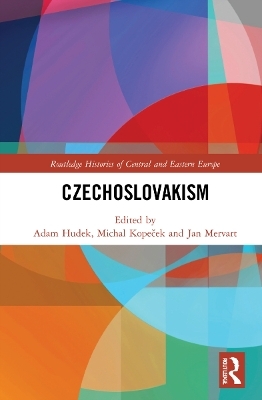
Czechoslovakism
Routledge (Verlag)
978-1-032-07072-8 (ISBN)
This collection systematically approaches the concept of Czechoslovakism and its historical progression, covering the time span from the mid-nineteenth century to Czechoslovakia’s dissolution in 1992/1993, while also providing the most recent research on the subject.
"Czechoslovakism" was a foundational concept of the interwar Czechoslovak Republic and it remained an important ideological, political and cultural phenomenon throughout the twentieth century. As such, it is one of the most controversial terms in Czech, Slovak and Central European history. While Czechoslovakism was perceived by some as an effort to assert Czech domination in Slovakia, for others it represented a symbol of the struggle for the Republic’s survival during the interwar and Second World War periods. The authors take care to analyze Czechoslovakism’s various emotional connotations, however their primary objective is to consider Czechoslovakism as an important historical concept and follow its changes through the various cultural-political contexts spanning from the mid-nineteenth century to the breakup of Czechoslovakia in 1993.
Including the work of many of the most eminent Czech and Slovak historians, this volume is an insightful study for academic and postgraduate student audiences interested in the modern history of Central and Eastern Europe, nationality studies, as well as intellectual history, political science and sociology.
Adam Hudek is a senior researcher at the Institute of History of the Slovak Academy of Sciences. His research concentration is the intellectual history of socialist Czechoslovakia. He is the editor in chief and coauthor of the work Overcoming the Old Borders. Beyond the Paradigm of Slovak National History (2013). Michal Kopeček is a researcher at the Institute of Contemporary History of the Czech Academy of Sciences and co-director of Imre Kertész Kolleg in Jena. His work focuses on comparative history of political and social thought in East Central Europe. He is the co-author of the two-volume A History of Modern Political Thought in East Central Europe (2018). Jan Mervart is a researcher at the Institute of Philosophy of the Czech Academy of Sciences. He specializes in the intellectual and cultural history of socialist Czechoslovakia. He is the coauthor of Karel Kosík and Dialectics of the Concrete (2021).
Introduction: Czechoslovakism: the concept’s blurry history Part One: From Kollár to Masaryk 1. Latent Czechoslovakism: a topic of politicization for 19th century liberal elites 2. Czechoslovakist reasoning at the turn of the 19th and 20th century 3. Hungarian government, administrative and supervisory bodies and the Czechoslovakist movement, 1895-1914: surveillance, misinterpretation and countermeasure 4. “Jews are Slovakia’s misfortune”: Czechoslovakism and antisemitism from the late 19th to the mid-20th century Part Two: Czechoslovakism in the time of “nation-state” building 5. Czechoslovakism in the first half of the Czechoslovak Republic: state-building concept or hackneyed old phrase? 6. Czechoslovakism in the eyes of interwar Slovak political parties 7. The failure of Czechoslovakism as a state-civic concept: the army and its minorities, 1918-1945 8. State festivities and constructing a Czechoslovak national community during the First Republic 9. The idea of Czechoslovakism in Czech history and civic education textbooks published between 1918-1938 10. Czechoslovak visual arts Part Three: Czechoslovakism during the communist dictatorship and democratic transformation 11. Czechoslovak ideology and Slovak communists 12. Discussions of Czechoslovakism and luďák-ness in the reformist era of 1960s 13. Czechoslovakism and Party theory of the so-called “national question” 14. Debating Czechoslovakism and Czechoslovak identity in the federation’s final years, 1989-1992 15. The problem of Czechoslovakism in Slovakia after November 1989 16. Yugoslavism throughout the 20th century: developments and tendencies
| Erscheinungsdatum | 01.10.2021 |
|---|---|
| Reihe/Serie | Routledge Histories of Central and Eastern Europe |
| Zusatzinfo | 1 Tables, black and white; 1 Line drawings, black and white; 1 Illustrations, black and white |
| Verlagsort | London |
| Sprache | englisch |
| Maße | 156 x 234 mm |
| Gewicht | 807 g |
| Themenwelt | Geschichte ► Allgemeine Geschichte ► Neuzeit (bis 1918) |
| Geisteswissenschaften ► Geschichte ► Regional- / Ländergeschichte | |
| Geisteswissenschaften ► Philosophie | |
| Naturwissenschaften ► Geowissenschaften ► Geografie / Kartografie | |
| Sozialwissenschaften ► Politik / Verwaltung ► Politische Systeme | |
| Sozialwissenschaften ► Politik / Verwaltung ► Politische Theorie | |
| Sozialwissenschaften ► Soziologie ► Spezielle Soziologien | |
| ISBN-10 | 1-032-07072-2 / 1032070722 |
| ISBN-13 | 978-1-032-07072-8 / 9781032070728 |
| Zustand | Neuware |
| Informationen gemäß Produktsicherheitsverordnung (GPSR) | |
| Haben Sie eine Frage zum Produkt? |
aus dem Bereich


